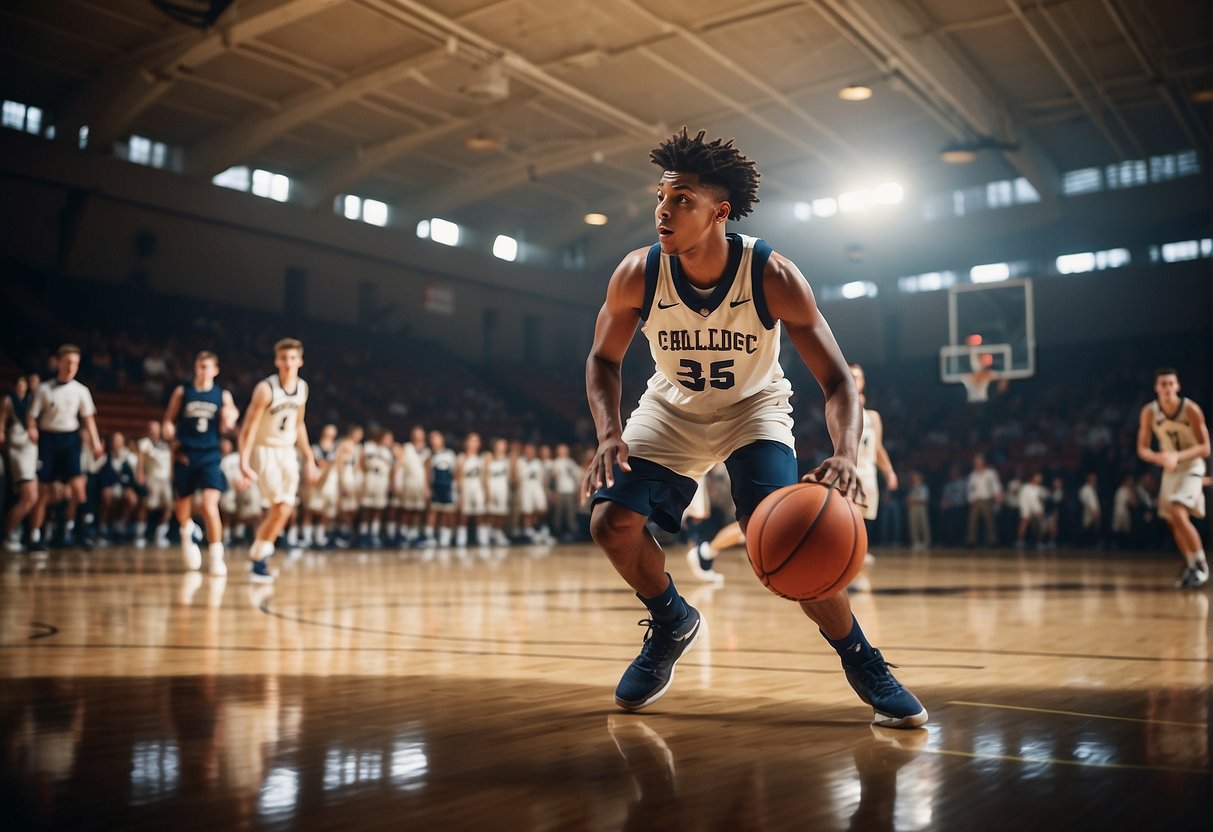Turn your basketball prowess into a scholarship opportunity with my comprehensive advice on how to get a basketball scholarship. Trust my expert guidance to navigate the application process and stand out to recruiters, increasing your chances of success.
How to Get a Basketball Scholarship?
When you dream of landing a basketball scholarship, it’s key to grasp what types of scholarships are available and the guidelines set by governing bodies like the NCAA and NAIA. Here’s a quick guide to get you started.
- NCAA Scholarships: The NCAA divides its scholarships among Division 1, Division 2, and Division 3 schools. Division 1 and Division 2 programs can offer athletic scholarships, but Division 3 institutions do not award athletic scholarships.
- Division 1: These are often headcount scholarships, which means the scholarship is a full-ride, covering tuition, room, board, and textbooks.
- Division 2 & Division 3: These programs typically offer equivalency scholarships, meaning they grant partial financial aid based on a percentage of a full scholarship.
- NAIA and JUCO Programs: Besides the NCAA, the NAIA and junior college system (NJCAA) also give athletic scholarships. NAIA scholarships can be a mix of headcount and equivalency, while NJCAA guidelines vary based on the college.
To vie for a college basketball scholarship, you’ll need to familiarize yourself with NCAA rules or NAIA rules, depending on which colleges you’re targeting. The NCAA Eligibility Center is a crucial step for NCAA programs; registering there is necessary. It’s important to note that NCAA Division 1 schools usually start recruiting early.
Eligibility and Academic Requirements

Before aiming for a basketball scholarship, it’s essential to understand that your academic achievements are just as crucial as your athletic prowess. The NCAA has specific criteria you must meet, and staying on top of these can set you apart from the competition.
NCAA Eligibility Center
You must first register with the NCAA Eligibility Center to compete in NCAA Division I or II sports and be eligible for an athletic scholarship. This step verifies that you meet both the amateurism standards and academic requirements—the foundation for any student-athlete’s career.
- Your Checklist:
- Complete the registration process with the NCAA Eligibility Center
- Ensure your academic records are in order and submitted
- Verify your status as an amateur athlete
Maintaining Good Grades
Keeping your grades up is imperative to remain eligible for a basketball scholarship. A minimum GPA is required, along with specific course credits during your high school years. Academics can directly affect your eligibility, so consider your classroom performance as part of your training.
- Key Academic Standards:
- Minimum GPA requirement: varies by school and division
- Required core course credits
- Constant monitoring and improvement of academic performance
SATs and ACTs
The SAT and ACTs are your academic stepping stones to college sports. NCAA standards include minimum scores on these exams, which, combined with your GPA, dictate your initial eligibility. Excelling on these tests can also open up opportunities for academic scholarships, further supporting your college journey.
- Standardized Testing Goals:
- Achieve NCAA benchmark scores
- Balance study time for both SATs and ACTs with basketball training
- Take tests early to allow for retakes if necessary
Meeting these eligibility and academic requirements is integral for securing your path to becoming a successful student-athlete. Remember, your skills on the court need to be matched by your diligence in the classroom.
Developing Your Basketball Talent

To secure a basketball scholarship, it’s crucial to enhance your skills on the court. Your journey involves participating in competitive teams, engaging in specialized training, and ensuring your physical condition matches the high demands of the sport.
Joining an AAU Basketball Team
Joining an AAU basketball team can expose you to higher levels of competition and increase your visibility to college scouts. AAU teams commonly participate in nationwide tournaments, allowing you to showcase your talent against some of the best players in your age group. Focus on demonstrating your capabilities in various positions, whether point guard, shooting guard, small forward, power forward, or center.
Attending Basketball Camps and Clinics
Participation in basketball camps and clinics is essential for personal development and learning advanced dribbling, passing, shooting, and defending techniques.
Such camps are often run by experienced coaches who can provide targeted feedback to improve your gameplay. Elite camps, in particular, can be critical for gaining recognition and developing the skills required to excel in high-level basketball.
Training and Physical Condition
Maintaining a rigorous training and physical conditioning routine is key to improving your athletic performance. This includes personalized workouts to enhance your physical condition, speed, agility, and strength. Remember to focus on basketball-specific drills that develop your on-court skills, ensuring you can handle the intensity of college-level games.
Marketing Yourself to College Coaches

In securing a basketball scholarship, effectively marketing yourself to college coaches is pivotal. Craft a standout athletic profile, share your best moments on the court through video, and establish direct communication with coaches to showcase your talents and character.
Creating an Athletic Profile
Your athletic profile is a professional summary of your career as a student-athlete. Start with crafting a concise Athlete CV where you highlight your playing history, statistics, academic achievements, and any accolades you’ve received. It’s essential to tailor your CV to the world of college sports, focusing on those aspects that set you apart from other recruits.
- Academic Record: List your GPA, test scores, and any academic honors.
- Athletic Achievements: Detail your statistical milestones, positions played, and any recognitions.
- Personal Statement: An opportunity to express your character and motivations in pursuing college basketball.
Highlight Film and Gameplay Videos
A compelling highlight film can capture a college coach’s attention. Include clips that illustrate your skills, understanding of the game, and sportsmanship in practice and matches. Game footage should show extended play to give coaches a sense of your decision-making and consistency. Remember to highlight moments that demonstrate your ability to perform in game situations relevant to a coach’s style of play.
Keep videos brief, ideally around 2 minutes for a highlight tape and up to 5-7 minutes for full game highlights. Ensure the video is high quality and your jersey number is visible to identify you easily.
Contacting College Coaches
When reaching out to college coaches, personalized emails have the most impact. Address the coach by name, express your interest in their program, and why you see it as a good fit. Attach your athletic profile and a link to your highlight film. Aim to convey:
- Your understanding of their coaching philosophy and how you can contribute.
- A brief overview of your sporting and academic background.
The Recruitment Process

Navigating the recruitment process can be demanding, but understanding key steps and timelines, identifying target schools, and effectively communicating with recruiters are essential to boosting your chances of earning a basketball scholarship.
Understanding the Recruitment Timeline
You should be aware that colleges recruit early; some basketball coaches start scouting talents as early as middle school. By high school, you need to be proactive, especially before junior year, to secure a scholarship. Deadlines are crucial, as is taking advantage of live periods when NCAA permits college coaches to watch prospective athletes play in person or have direct contact with them. Key showcase events often fall within these live periods and can significantly increase your exposure to college scouts.
Building a Target List of Schools
Creating a target list of schools that match your academic and athletic profile is an intelligent strategy. Start with a broad list and refine it over time, considering factors like team dynamics, educational programs, and location. Remember, coaches and scouts are looking for players who excel on the court and fit their team’s culture and academic standards.
Communicating with College Recruiters
Engagement with college recruiters is vital. Produce high-quality training videos and maintain good grades to demonstrate your dual commitment to sports and academics. Directly engaging with coaches through emails and attending camps can position you favorably within their recruiting radar. Remember, consistent and professional communication reflects your seriousness about playing at the college level and can help form a strong impression on the college coaches and scouts observing you.
Assessing Scholarship Offers

When you receive different basketball scholarship offers, it’s important to evaluate not just the financial aspect but also how well each college matches your career aspirations and your personal goals.
Comparing Financial Packages
To accurately compare financial packages, it’s crucial to look beyond just the percentage of tuition covered. Basketball scholarships can range from partial to full rides. When reviewing your offers, list out all the components, such as:
- Tuition
- Room and board
- Books and other educational expenses
- Additional benefits, like gear or travel allowances
For each scholarship offer, record the exact amount and duration. Also, consider the stability of the scholarship—whether it’s a guaranteed amount for four years or if it varies. A table can help you visualize and compare these packages side by side.
Determining College Fit and Career Goals
Finding the right college fit involves more than just the financial package. Reflect on what you want from your college experience and how it aligns with your career goals. Consider the following:
- The college’s academic reputation and the majors offered
- The competitiveness and track record of the basketball program
- The coaching staff’s expertise and mentoring style
- The team dynamics and culture
- Post-graduation support and networking opportunities within the sport
By assessing how each college measures against these factors, you’re more likely to choose an institution where you can academically and athletically thrive. Remember, a more considerable scholarship at a college that doesn’t fit your needs may not be as beneficial as a more minor scholarship at a college that’s a perfect fit.
Academic and Lifestyle Considerations
Achieving a basketball scholarship is a dream for many, but it’s important to remember that your academic performance and lifestyle choices are crucial components of your success. As a student-athlete, maintaining good grades and balancing your education with basketball are vital to positioning yourself for scholarship opportunities.
Balancing School and Basketball Commitments
As a high school athlete, you’ll need to master the art of time management. Juggling practices, games, and schoolwork can be challenging but vital to your scholarship prospects. Make sure to:
- Organize your schedule so you know when assignments are due, and can allocate time for studying around basketball practices and matches.
- Communicate with your teachers about your basketball commitments so they understand when you need extra help or a little deadline flexibility.
Understanding College Costs and Financial Need
Before you shoot for a scholarship, it’s crucial to understand college costs and financial need:
- Ivy League schools and similarly prestigious institutions may not offer athletic scholarships, but they do provide need-based financial aid.
- Total college costs go beyond tuition; consider room, board, books, and other expenses.
To navigate this, start by:
- Calculating the total expected cost of attendance at your targeted schools.
- Assessing your own financial need to understand what kind of scholarship or financial aid package you will require.
As a high school athlete, if you’re not offered a scholarship straight away, walking on is an option where you can prove your worth on the college team — but be mindful that you’ll need to have your academics and finances in order, since walk-ons often do not receive scholarship aid initially.
Alternative Paths to Playing College Basketball
When you’re aiming for a college basketball experience, it’s essential to know that there are multiple avenues beyond the highly competitive Division 1 level. Exploring these opportunities can lead to substantial playing time and scholarship potential.
Exploring Junior College (JUCO) Options
Junior College, commonly called JUCO, can be an excellent stepping stone if you’re looking to develop your skills and academic profile. The National Junior College Athletic Association (NJCAA) offers opportunities in three different divisions, much like the NCAA. JUCO programs provide two years of competition, after which you can transfer to a four-year institution. Many successful athletes have started at JUCO institutions before moving up to the NCAA levels.
- NJCAA Division 1: Offers full scholarships covering tuition, room, board, and books.
- NJCAA Division 2: Provides scholarships for tuition, fees, and books only.
- NJCAA Division 3: Does not offer athletic scholarships but can be more cost-effective.
Considering Division Levels and NAIA Schools
When considering college basketball, you should look at the different NCAA divisions as well as schools in the National Association of Intercollegiate Athletics (NAIA). Here’s a brief overview:
- NCAA Division 1: Highly competitive, offers full or partial scholarships.
- NCAA Division 2: Competitive, but with more balance between athletics, academics, and extracurriculars. Scholarships are often partial.
- NCAA Division 3: Does not offer athletic scholarships, but you may qualify for academic or need-based financial aid.
The NAIA is another governing body that offers scholarships and tends to be smaller schools compared to NCAA institutions. NAIA schools are known for their community involvement and close-knit campuses. They can be a great fit if you’re looking for a more personalized college experience while still competing at a high level.
Life After the Scholarship
Career Prospects and Further Education
After the completion of your scholarship, you have the opportunity to continue leveraging your basketball talent or to focus on other educational pursuits. Many basketball programs offer a strong network of alumni and connections that can help propel your career—whether in sports, coaching, business, or another field. Should you choose to branch out academically, your discipline and teamwork skills learned on the court will be immensely beneficial.
To further enhance your qualifications, you might consider pursuing graduate studies. Universities often value former athletes for their dedication and work ethic, which can translate into scholarships at the graduate level as well.
Opportunities in Professional Basketball
Your journey with basketball doesn’t have to end after college. If you’ve excelled at your college basketball program, you may attract attention from professional teams. While reaching the NBA is a challenging feat that requires exceptional skill, the right height, and a clean record of conduct—since bad behavior can drastically impact your professional prospects—there are other basketball leagues around the world where talented players can make a career.
For those who continue to aim high and possess the necessary talent, players might receive offers or attend tryouts that could open doors to becoming a professional athlete. It’s important to stay committed, maintain peak physical condition, and consistently improve your game to increase your chances of going pro.
FAQ
How do you get a basketball scholarship in the UK?
In the UK, securing a basketball scholarship typically involves a combination of talent, academic achievement, and networking.
How to get a basketball scholarship in Canada?
Similar to the process in the UK, getting a basketball scholarship in Canada involves a combination of athletic skill, academic performance, and networking.
Does Harvard have a basketball scholarship?
No, Harvard University does not offer athletic scholarships, including basketball scholarships. However, Harvard provides need-based financial aid to all admitted students, including athletes. Students who are talented in basketball and meet Harvard’s academic standards may receive financial aid packages that help cover the costs of attending the university.
If you enjoyed reading about the topic: how to get a basketball scholarship, leave a comment and stay updated on Pinterest for more exciting basketball news.
Leave me a comment and make sure to also check out What Position Does LeBron James Play.





